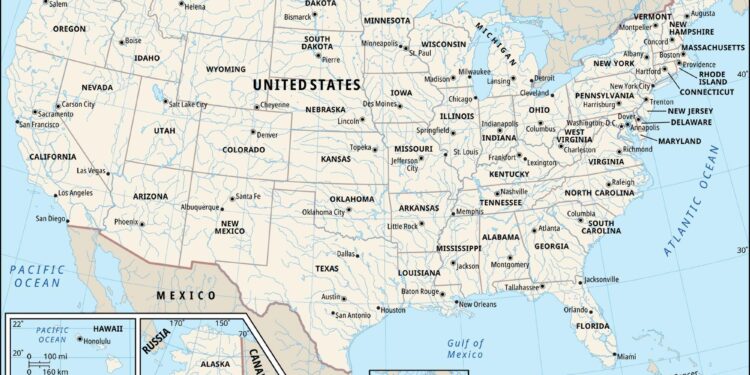As the United States navigates an increasingly volatile global trade landscape, a new concern is emerging at the heart of the dispute: the nation’s knowledge economy. While tariffs and manufacturing have dominated headlines, experts warn that America’s greatest vulnerability in the ongoing trade war may lie in its intellectual assets-its innovation, technology, and skilled workforce. This often-overlooked facet of economic power faces unprecedented risks amid rising tensions with key trading partners, raising critical questions about the future of U.S. competitiveness in the international arena.
The Strategic Risks Facing America’s Knowledge Economy in the Trade War
In the evolving landscape of the US-China trade war, the knowledge economy-anchored by technological innovation, intellectual property, and talent acquisition-has emerged as a critical vulnerability for the United States. Unlike traditional sectors reliant on manufacturing or natural resources, the knowledge economy depends heavily on open information flows and global collaboration, factors that are increasingly constrained by rising tariffs, export controls, and restrictions on foreign talent recruitment. These barriers jeopardize America’s leadership in areas such as artificial intelligence, semiconductor design, and biotechnology, potentially diminishing its competitive edge in the global market.
Several strategic risks compound this vulnerability:
- Talent Drain: Visa restrictions limit the influx of international students and skilled workers essential to innovation hubs.
- Supply Chain Disruptions: Restrictions on Chinese investment in US tech firms cause uncertainty and disrupt cross-border R&D partnerships.
- Intellectual Property Risks: Heightened scrutiny and countermeasures slow the transfer of technology while increasing costs.
| Risk Category | Impact | Potential Outcome |
|---|---|---|
| Talent Drain | Reduced global STEM workforce | Innovation slowdown |
| Supply Chain Disruptions | Delayed product development cycles | Market share loss |
| IP Risks | Increased litigation and compliance costs | Investment reluctance |
How Intellectual Property Challenges Undermine US Competitive Edge
In an era dominated by rapid technological advancement, the United States’ intellectual property (IP) framework faces increasing strains that directly impair its global standing. Problems such as inconsistent enforcement of IP laws, rising incidents of patent infringement, and the theft of proprietary technology have created vulnerabilities that rival nations, particularly China, exploit aggressively. These challenges erode the value of American innovation, discouraging domestic investment and allowing competitors to gain undue market advantages without bearing the costs of research and development.
Key factors contributing to this erosion include:
- Inadequate cross-border enforcement: Fragmented international cooperation limits the U.S.’s ability to protect its patents overseas.
- Complex domestic regulations: Lengthy legal battles and ambiguous rulings undermine timely resolution of IP disputes.
- Cyber espionage: State-sponsored hackers increasingly target lucrative knowledge economy sectors to pilfer trade secrets.
| Impact Area | Effect on Competitiveness | U.S. Response Status |
|---|---|---|
| Tech Innovation | Slowed commercialization cycles | Under reform |
| Manufacturing | Loss of proprietary designs | Reactive enforcement |
| Pharmaceuticals | Fake drug proliferation | Ongoing litigation |
Policy Solutions to Safeguard Innovation and Strengthen Economic Resilience
To counteract the vulnerabilities exposed by escalating trade tensions, policymakers must prioritize strategic investments in research and development (R&D) alongside robust intellectual property protections. Strengthening partnerships between government agencies and the private sector can accelerate innovation cycles while mitigating risks related to technology transfer. Moreover, enhancing workforce development programs to equip American workers with skills for emerging industries is crucial to maintaining a competitive edge in the global knowledge economy.
Beyond investments in innovation, creating resilient supply chains that reduce dependence on sensitive foreign suppliers is essential. Policymakers should incentivize domestic production of critical components and foster a diversified network of international collaborators to withstand geopolitical shocks. Below is a summary of key policy levers being considered to safeguard innovation and economic stability:
- Increased R&D funding: Targeted grants for cutting-edge tech sectors
- IP enforcement: Stronger legal frameworks to protect proprietary knowledge
- Workforce training: Upskilling initiatives in STEM and advanced manufacturing
- Supply chain resilience: Incentives for reshoring essential industries
- International collaboration: Strategic alliances with trusted trade partners
| Policy Area | Objective | Expected Impact |
|---|---|---|
| R&D Investments | Accelerate innovation pipeline | Boost tech leadership |
| IP Protection | Safeguard proprietary assets | Reduce tech theft |
| Skills Development | Enhance labor productivity | Close talent gaps |
| Supply Chain Security | Decrease foreign dependency | Improve economic resilience |
Final Thoughts
As the trade war continues to reshape global economic dynamics, the United States faces a critical challenge in safeguarding its knowledge economy-a sector that underpins innovation, competitiveness, and national security. Policymakers must carefully balance protective measures with openness to collaboration, ensuring that America’s intellectual capital remains a source of strength rather than vulnerability. The outcome of this high-stakes struggle will not only determine the trajectory of U.S. economic power but also the future of global trade relations in an increasingly interconnected world.










